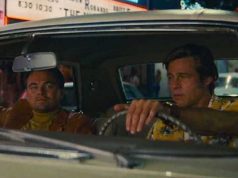What kind of film would you expect from a fashion designer who has never made a film before? Something glossy, favoring style over substance? Something flashy, perhaps? Something ornate and weird that you can’t imagine a regular person ever watching? Yeah, me too. Yet here’s “A Single Man,” directed by Tom Ford — whose designs revitalized Gucci and Yves Saint-Laurent before he opened his own fashion house — and it’s an impressive debut for anyone, let alone someone accustomed to working in such a different medium. The film is elegant and subtle, restrained and sophisticated. It deals with death and grief but doesn’t wallow in melodrama. If he wants it, Ford could have an entirely new career ahead of him.
Based on Christopher Isherwood’s 1964 novel, which Ford adapted with David Scearce, “A Single Man” is told through the eyes of George Falconer (Colin Firth), a middle-aged British college professor in Los Angeles who is still reeling from the death of his partner, Jim (Matthew Goode), eight months earlier. George and Jim had been together for 16 years, but in 1962, when the film is set, such relationships are “invisible,” which only makes the grieving process more difficult. In narration, George tells us that “for the past eight months, waking up has actually hurt.” He was older than Jim, and now he feels too old for anyone else.
On this day, George is going about his normal routine, teaching Aldous Huxley to apathetic young minds and making dinner arrangements with his friend Charlotte (Julianne Moore), a fellow Brit who lives nearby in his upscale suburban neighborhood. It is soon apparent, however, that George is “putting his affairs in order,” as they say. He’s planning something.
The film takes place entirely on this one day except for a few flashbacks to George and Jim’s life together, and in particular to the moment George got the phone call informing him of Jim’s death. That’s the scene that typifies both Colin Firth’s heartbreaking performance and Ford’s marvelously careful directorial touch. We hear the caller’s voice over the phone (it’s Jon Hamm, of TV’s “Mad Men,” which is unfortunately a little distracting) but do not see him. We see only George, hearing the news, reacting, finishing the conversation, hanging up. It’s mostly done in one unbroken take. There isn’t much dialogue; the reaction is in Firth’s face. It’s not over the top. There are no histrionics. But it’s devastating, the very picture of a meticulous actor conveying powerful emotions without tricks or artifice. I don’t think I’ve seen a better bit of acting in one scene all year.
Firth is terrific throughout the film, which rests heavily on his shoulders. He is often the only person on the screen. Second-billed Julianne Moore appears in only a few scenes. Nicholas Hoult (the boy in “About a Boy,” now grown up) plays one of George’s students, a mischievous fellow named Kenny who takes a personal interest in his teacher’s well-being, but he, too, doesn’t approach anything like being a “lead” character. This is George’s film — he is a single man, after all, surrounded by people yet alone — and Firth’s performance must be the best of his career. It would have to be, to make what is almost a one-man show work so well.
Ford has an eye for composing shots that are lovely, even poetic, and though this sometimes makes the film look like a Calvin Klein perfume commercial, the overall effect is one of beauty. This is where Ford’s experience as a fashion designer comes in handy: He knows what is pleasing to the eye. He and his cinematographer, Eduard Grau, have done something highly unusual with the film’s colors, too, often subtly moving from drained grays to more vibrant hues and back again, sometimes in the same scene. When something appears in George’s life that gives him cause for hope, his outlook literally grows brighter. On paper, it may sound like an obvious use of symbolism, but Ford and Grau do it carefully, never drawing undue attention to it. The effect, like everything in the film, is delicate. (I also love Abel Korzeniowski’s urgent and haunting musical score.)
Though the novel’s author was gay, as is the protagonist (as is Ford, for that matter), “A Single Man” doesn’t strike me as a uniquely “gay” story. George’s homosexuality adds dimension to the scenario — he cannot grieve quite as publicly as a straight man losing his wife would, for example — but it’s not what defines him, nor does it define the movie. George is searching for clarity in his life, just as any person would after losing a spouse. The way he approaches that clarity, and what it means for him thereafter, is profound.
I had to think for a while before I determined whether I like the film’s conclusion. It turns out I do. It’s not a question of whether the ending is happy or sad, but of whether it’s the ending the story deserves. What emerges as the film’s message is that despite our efforts to control and organize our lives, some things are out of our hands. We can plan and calculate and take charge all we want, and yet there will still be elements of randomness that are beyond our control. Paradoxically, “A Single Man” is obviously the result of very careful and deliberate work — but it comes off smoothly, without any of that unbidden chaos. That’s a neat trick, especially the first time out. Even if Ford never makes another film, this one will stand as a singular piece of work.
A- (1 hr., 39 min.; )





